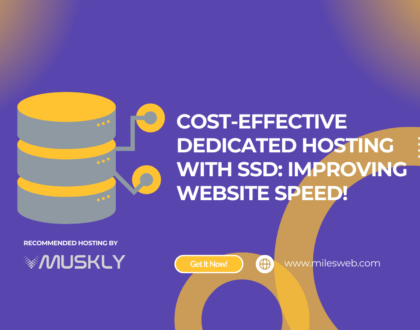
Cloud computing is a necessity of the time for modern businesses to attain agility, cost savings, and competitiveness. More and more businesses are using the cheapest cloud server to build their web presence with enhanced scalability. The cloud migration market’s estimated projected growth will cross $806.41 billion by 2029, with a CAGR of 28.24%.
Businesses are rapidly choosing cloud hosting to streamline their IT infrastructure and operations. The article explores in-depth information about cloud hosting and how beginners can tap its potential.
What is Cloud Hosting?
Cloud hosting is a type of web hosting where on-demand computing resources are scaled dynamically and distributed across multiple interconnected cloud servers. There is a remote data center. The approach leverages multiple servers to operate and ensure maximum online availability. This results in higher performance and reduces downtime risk. Thus, the cloud server cost per month is lower for a longer time.
Benefits of Cloud Hosting
1. Flexible Scalability
Cloud hosting services allow businesses to scale their resources up or down based on demand. This flexibility adds more resources to the server, helping website owners manage peak traffic and achieve optimal performance without overspending.
2. Cost Efficiency
In cloud hosting, you only pay for the resources you use. This pay-as-you-go model eliminates the need for significant upfront hardware investments and reduces ongoing maintenance costs, making it a cost-effective solution for several businesses.
3. High Reliability
Cloud hosting plans offer higher reliability by distributing data across multiple servers. It reduces redundancy and ensures operational continuity even if one server fails. It minimizes the risk of service interruptions, ensuring consistent availability.
4. Boosted Performance
Cloud servers smartly handle the workload, improve performance, and quicken content deliveries. This setup provides users with a better experience by smartly decreasing page load times and higher traffic.
5. Strong Security
Cloud hosts set up servers with strong security measures, such as encrypting data, regular security audits, and strong access controls. These measures protect sensitive data and help reduce the risk of cyber threats.
6. Basic Accessibility
Cloud hosting allows you to access your applications and data wherever you are connected to the Internet. This access facilitates remote work and collaboration and allows teams to work regardless of location.
7. Automatic Updates
Cloud hosting providers manage and apply automatic software and hardware updates. This ensures that your systems are continuously updated with the newest versions, with improved security patches and performance boosts automatically, without your need to do anything.
8. Eco-Friendly
Cloud hosting is efficient in terms of resources, with less usage and better utilization of cloud server resources. Most data centers use power-efficient processes and technology, and they have far less of a carbon footprint than the traditional approach to hosting.
9. Complete Maintenance and Support
When using cloud hosting, you do not have to worry about any support or maintenance-related responsibilities. The cloud hosting provider maintains a 24/7 monitoring, troubleshooting, and customer support effort. Having someone else continually focused on issues allows for less disruption in service delivery.
How Beginners Can Use Cloud Hosting Effectively
1. Familiarize Yourself with the Control Panel
Cloud hosting providers typically offer their customers a control panel like cPanel, Plesk, or a proprietary control panel for every hosting configuration. As a beginner, you need to familiarize yourself with the control panel’s features.
With your control panel, you will be able to manage your cloud hosting experience more straightforwardly. You’ll be able to try everything out by traveling through the menus, exploring each option, and making simple changes that will help you develop your knowledge and confidence in using your cloud hosting account.
2. Leverage One-Click Installers and Website Builders
New website developers who are not very tech-savvy will appreciate the one-click installer tools. One can install WordPress, Joomla, and Drupal software easily and quickly since the installation is done on your behalf without you having to write any code. One can quickly create and have a working site using the easy-to-use web-based design software’s drag-and-drop feature.
Users who choose these basic setup options can create professional websites at no cost and without developer skills. Premade website templates and plugins allow users to personalize their sites’ appearance and performance.
3. Monitor and Optimize Performance
Cloud hosting enables you to add or remove resources as needed based on the number of visitors to your website. One common practice for new users is to observe how their website operates during increased traffic by watching the CPU and RAM meter and gauging the server’s load time and availability. Generally, cloud hosting service providers have included monitoring tools that show this data to their users.
Regularly checking your site will optimize its performance and prevent its unavailability. Implement effective means of reducing image file sizes, enabling cache, and deploying CDN. Performance monitoring and optimization ensure your site is fast, supporting its growing traffic needs.
Wrap Up
Cloud hosting is a powerful option that delivers flexibility, scalability, and exceptional performance for websites of all sizes. Although it can be challenging for first-time users, a little research can help them understand how to use the technology effectively. By selecting an affordable, dependable cloud hosting provider for your website and then learning how to navigate the control panel, use the one-click installers, and track and analyze performance, you can streamline your cloud hosting experience.
Each of these tips is crucial for a perfect setup and will help you learn to manage your website without in-depth technical knowledge. Once you’ve gained some familiarity with cloud hosting, you’ll be able to explore more advanced features, like customizing advanced settings and scaling your resources as your website’s traffic ramps up.
Top Web Hosting Options For Portfolio Websites: Showcasing Your Projects!
Whether you are a professional, an artist, or a business organization, building a unique and...
Continue ReadingTop Web Hosting Options For Portfolio Websites: Showcasing Your Projects!
Whether you are a professional, an artist, or a business organization, building a unique and...
Continue ReadingWordPress Hosting Designed For Global Reach!
A comprehensive online presence within the global digital space can no longer be regarded as...
Continue ReadingCost-Effective Dedicated Hosting With SSD: Improving Website Speed!
In the digital world, website speed is no longer a luxury. It is necessary when...
Continue Reading8 Highly Effective Tools for Website Analytics Recommended for Small Businesses!
Navigating the landscape of website analytics tools can be daunting for small businesses, so we’ve...
Continue Reading




